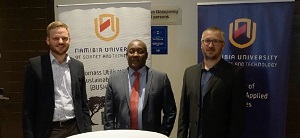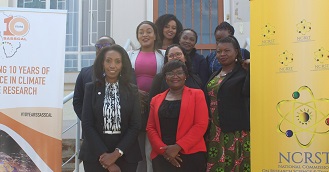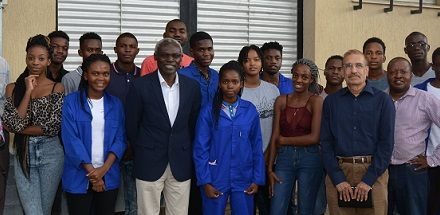
NUST set to become a centre for biomass research

The Namibia University of Science and Technology (NUST) is in the process of establishing an analytical service centre for the biomass industry.
This is according to Professor Habauka Kwaambwa, Head of the Department for Natural and Applied Sciences in the Faculty of Health and Applied Sciences at NUST. Kwaambwa added this will allow the support of a wide range of industries and applications and help Namibia to become more independent in testing woody biomass samples in future.
Kwaambwa, who was speaking at the NUST BUSH Project Closure Workshop held on Friday, 22 October said in most cases, value addition of biomass requires specific analyses.
“Few analytical services were available for the biomass industry within Namibia. The industry had to rely on laboratories outside the country which is costly and time-consuming. Today, this has changed,” he said.
The project titled Biomass Utilisation by Sustainable Harvest (BUSH) ran from November 2018 to July 2021. Various researchers presented findings of a three-year project exploring sustainable biomass utilisation at the closure workshop in Windhoek.
“While bush encroachment constitutes an immense challenge for Namibia, it also opens significant commercial, as well as unprecedented socio-economic and ecological opportunities,” said Professor Hannes van der Walt, Dean of the Faculty of Engineering. “At NUST we are proud to be taking the lead in shaping these amazing new opportunities for Namibia.”
The sub-project on ‘Biochar Production, Processing and Testing’, led by Dr Ibo Zimmermann, Associate Professor in the Faculty of Natural Resources & Spatial Sciences, looked at how biochar can create income for farmers and entrepreneurs as well as benefits for crop and rangelands.
The project developed prototypes for stoves that heat water or allow cooking while producing biochar. Ultimately, this can make biochar production accessible to many Namibians. Biochar can also be instrumental in rangeland restoration and horticulture production: adding biochar to soils can create housing for beneficial microbes, return minerals and increase water holding capacity. However, the research showed that these benefits will only be realised in the long-term.
A ‘Techno-Economic Assessment of Bio-Gasification Technologies’ based on encroacher bush was conducted. This technology is highly relevant for electrification of off-grid communities and businesses such as hospitality operations. With gasification, Namibia can develop a powerful renewable energy source.
Based on the assessment of the ‘Production Technology for Animal Feedstock from Bush’, project findings can help farmers in their decision of purchasing the appropriate machinery for the production of bush feed.
Research finding showed, that Namibian conditions are very challenging and that many imported machines struggle. It is important for farmers to realise that costs of running imported machines will be considerably higher than what is noted in the manufacturer’s or supplier’s specifications.
One sub-project looked into the opportunity of Wood Plastic Composite Production Technologies. These are mixtures of thermoplastic polymers and wood flour. They can be manufactured in different colours, shapes and sizes and can be used for a wide variety of applications, including windows, door frames, fences, landscaping timbers and furniture.
Timoteus Mufeti, Environmental Commissioner of the Ministry of Environment, Forestry and Tourism said supporting science institutions is one of the keys to build a strong bush biomass sector in Namibia which is based on knowledge.
“As the bush biomass sector grows, we have to ensure that equally scientific research capacities are built that can support that growth. The NUST BUSH project showed that the development of innovative technology in the field of bush biomass utilisation can come from within Namibia for a wide range of value chains that can be taken up now by the private sector to make an economically feasible case,” Mufeti said.
The NUST BUSH project was financed by the GIZ project on Bush Control and Biomass Utilisation (BCBU) with an overall value of N$5.3 million.
f.l.t.r: Johannes Laufs, Team Leader of the GIZ Bush Control and Biomass Utilisation Project; Timoteus Mufeti, Environmental Commissioner and Evert Strydom, Principal Investigator and Engineering Lecturer at NUST.












































